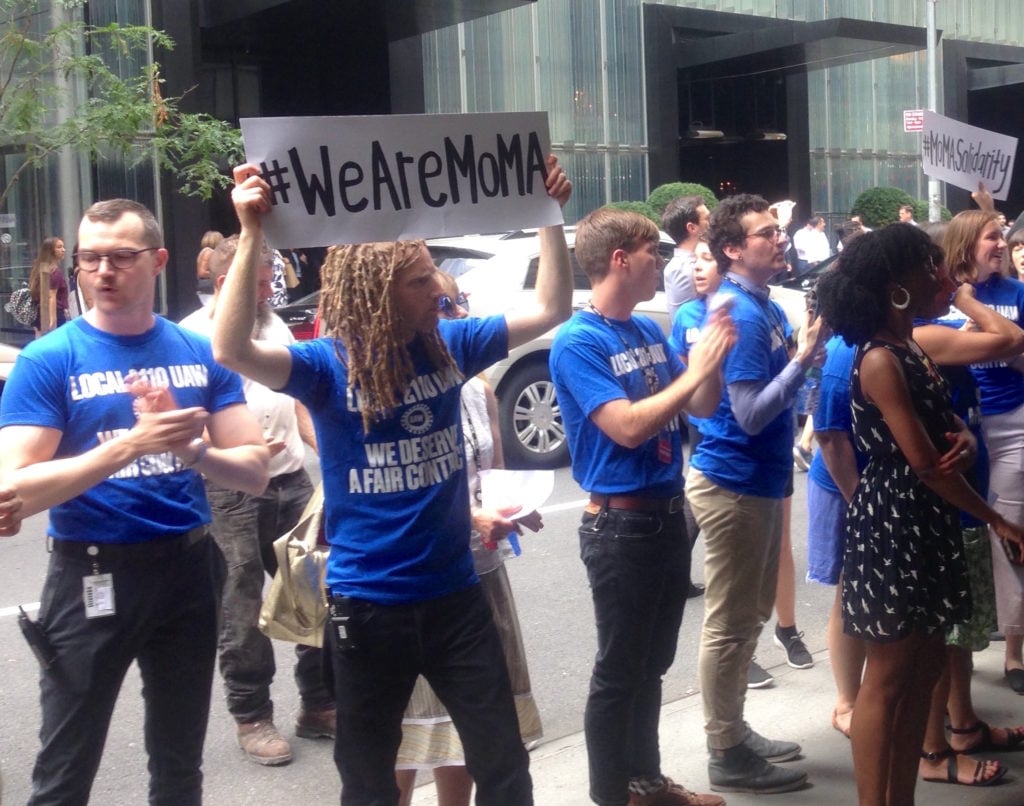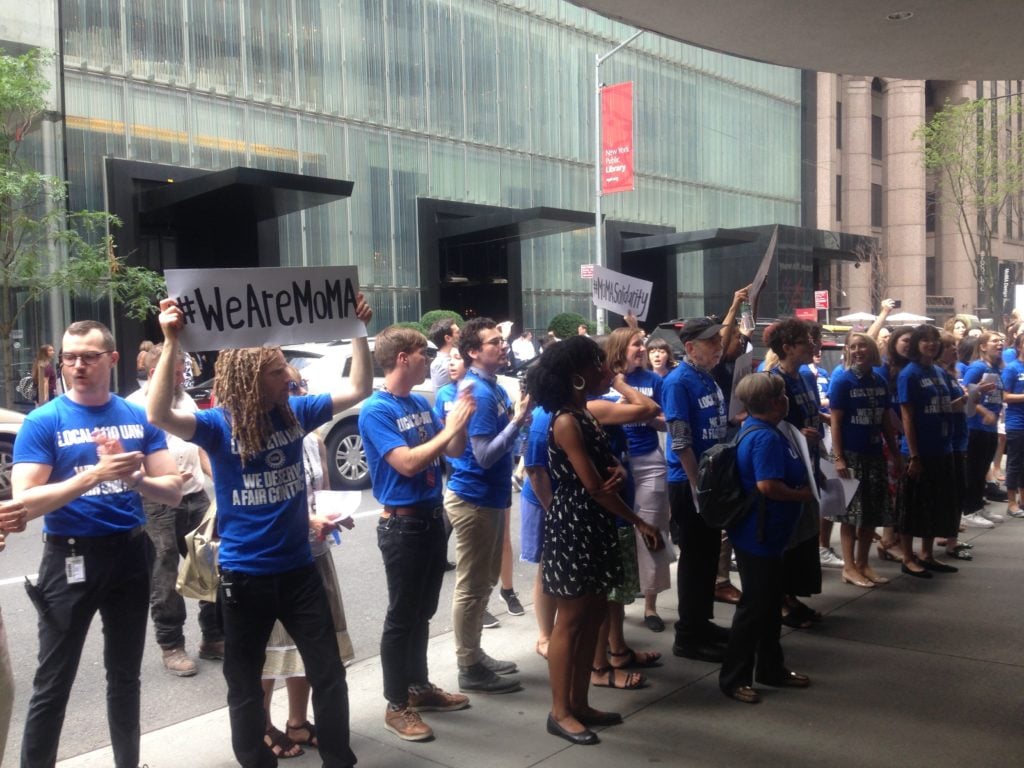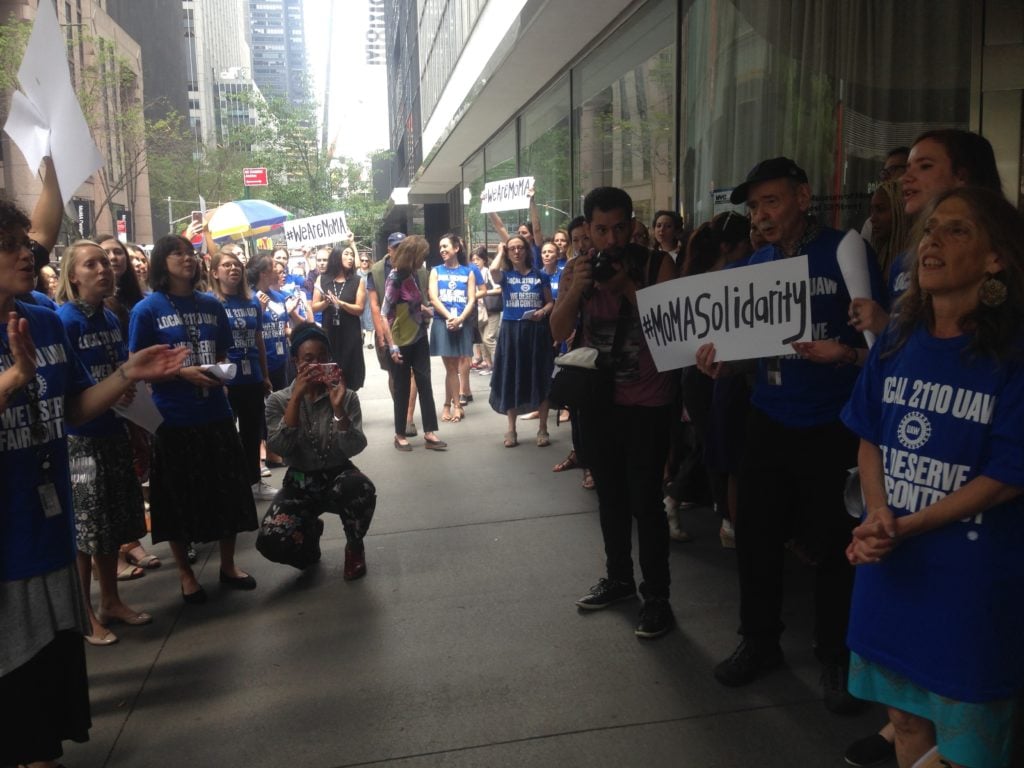Politics
MoMA Union Workers Occupy the Museum’s Lobby in Protest as Contract Negotiations Resume
Contract negotiations will resume tomorrow, and union members are united in their call for a fair contract.

Contract negotiations will resume tomorrow, and union members are united in their call for a fair contract.

Sarah Cascone

Presenting a united front, an estimated 200 members of MoMA Local 2110 walked off their posts on Monday afternoon at New York’s Museum of Modern Art, descending the stairs into the museum lobby to protest the current contract offer being offered by the museum administration.
“We are showing our solidarity and unity as a union membership,” union president Maida Rosenstein proclaimed, as the members gathered outside the museum, chanting rallying cries such as “Modern art, ancient wages!” The entire event lasted no longer than an hour before the union members returned to work.
“This was an incredible showing,” added Daniel Fermon, an associate librarian at the museum and the unit chair of MoMA’s union chapter. “What we saw today was an inspiring degree of unity and anger at the institution for not moving at the bargaining table. It was important that we were able to convey to them what the feeling is throughout the membership, not just for a small group of committed activists participating in collective bargaining,” he told artnet News.
Clad in their blue union shirts, the workers began the action by singing a version of “Solidarity Forever,” written in 1915 to the tune of “The Battle Hymn of the Republic” in addition to a long a staple of union rallies. The singing and chanting took place in front of hundreds of museum visitors, and was “really pretty dramatic,” Rosenstein said.
For the occasion, Ashley Argoti, a member of the union’s activist committee, came up with a new MoMA-specific verse for the classic union anthem. “It is we who stock the products/sell the tickets where they wait/work long overtime hours with no compensation paid,” the protestors sang, in lieu of the traditional words about plowing the prairies and building cities.
“I wanted to tweak the lyrics to really fit the museum,” Argoti told artnet News. “It really is retail workers, it’s us who stock the products, and it’s us who sell the tickets. It’s a lot of frontline workers here at the museum who are unionized.”

MoMA Local 2110 members protest at the Museum of Modern Art ahead of contract negotiations. Photo courtesy of MoMA Local 2110.
A white-collar chapter of the United Auto Workers Union, MoMA Local 2110, or PASTA (the Professional and Administrative Staff Association of the Museum of Modern Art) represents some 260 museum employees at various levels, from the gift shop and the front desk to librarians and curators.
Contract negotiations began in April, as the previous contract—also negotiated amid protests in 2015—expired on May 20. Since that time, union staffers have been working without a contract. Collective bargaining resumes tomorrow after talks were temporarily halted while various parties were on summer vacation.
“The negotiating committee feels very empowered because you are behind us, you are standing alongside us, you are with us, even if you are not in the room,” Rosenstein told the union. “We want the museum to know how strongly the membership feels about the issues that we have on the table.”

MoMA union workers protest at the Museum of Modern Art on Monday, August 6, 2018. Photo by Sarah Cascone.
In an email to artnet News, a MoMA representative said the museum stood by its original comments on the negotiations: “We continue to make progress with Local 2110 at the bargaining table. It’s been a productive process and we’re confident we’ll arrive at an amicable resolution, as we have during prior negotiations with Local 2110 and our four other unions. MoMA’s extraordinary staff are the best in the world and we are committed to reaching a contract with Local 2110 reflecting that.”
The union’s biggest concerns are preserving salary step increases and improving health care plans. The museum has proposed eliminating step increases and it has been reluctant to offer health spending accounts for union members at the upper salary levels.
The union has been outspoken in its rejection of the current contract offer, criticizing the museum for attempting to reduce worker benefits on the eve of the completion of the museum’s massive expansion plan, due to be unveiled in 2019. The union claims that workers, who are not compensated for overtime, have routinely worked extra hours to prepare for the expansion.
Other key issues are the lack of job security for curatorial assistants (currently hired only for four-year terms with no job security) and the museum’s request to hire temporary workers for up to a year at a time. (Current union rules limit temp jobs to six-month periods.)

MoMA union workers protest at the Museum of Modern Art on Monday, August 6, 2018. Photo by Sarah Cascone.
“Hopefully, MoMA will get the message. If they don’t, we’re gonna do it again and again and again until they make a fair contract offer,” Rosenstein assured the gathered crowd, encouraging them to urge union members who were too afraid to attend the demonstration to join the fight. “Tell them that together, we can win a fair contract!”
Should the two sides be unable to reach an agreement, MoMA Local 2110 could call for a vote to strike, as the union did in 2000 for 134 days. Ahead of tomorrow’s renewed negotiations, however, Fermon characterized the mood among the negotiating committee as one of “cautious optimism—we’re going into collective bargaining tomorrow so we’ll know more then.”
“Obviously we would prefer to have a peaceful resolution to this negotiation, no question,” Rosenstein said following the demonstration. “But we have been on strike before, and if we had to do it again, we would.”